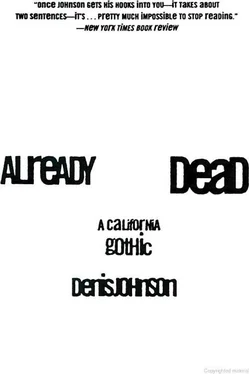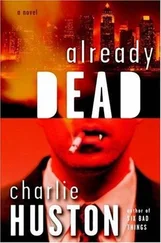A white Cadillac materialized on his left and drifted past and faded away like a thought.
It seemed lucky now that he and Billy Fairchild had agreed in advance on a sports car. Otherwise he’d have brought his surfboard along, it would be sticking out the window at this moment, and he wouldn’t be able to shut out the dust. As it was, he was packing a bowling ball and a trumpet and the accoutrements for other hobbies he’d suddenly been seized with a desire to develop because he’d been feeling very much at loose ends. He’d made the drive down just Already Dead / 167
last week; within two days he’d sold the ’38 Hudson he and Billy had restored, reinvesting the seven hundred profit in this wrung-out antique and performing temporary wonders on it to the degree, at least, that it was now rolling him north. This old Mercedes would be impossible to restore unless they got a line on parts. So what? Billy would be happy just contemplating it among his other pitiful monsters, not one of which he read as a failure.
In Clarence’s vision Billy Fairchild, over the last couple of years, had taken on real stature because when it came to self-reliance, Billy was an actual instance. He had his episodes, but he’d learned for the most part to separate his spirit from the diseased part of him, the head, which produced the worthless thoughts. Every once in a while he jagged a few days on coffee and wrote letters to the president and screamed in the woods, but did it matter? Witch doctors behaved similarly. It was part of what made them valuable. Meadows felt he’d rather have a mad hermit defending him than a lawyer owned by credit-card companies.
To find the people who’ve become truly sane, seek among those who’ve managed to do without sanity. The rest of us, Meadows thought, just brainlessly acquiesce.
Moving forward in first gear, Meadows decided he could travel on in this fashion indefinitely, groping ahead blind and strangled. Which was fine except that it too closely resembled life in general.
Again on his left, he passed two cars stopped in a kind of embrace, the huge intimacy of which he felt almost embarrassed to be witnessing.
It didn’t look too serious an accident. The cars’ owners stood out on the median, one man scrutinizing the wrinkled bumper of his vehicle and the other craning, searching the little limit of visibility for…and then Meadows was past and the whole thing absorbed by the amber twilight, sucked up as by a sponge.
Off to the right he saw, occasionally, other things, a wavering mile-post, a green unreadable highway sign, a stretch of faded fence. Fascinating the way each seemed to jump up solid, hover there, and then dematerialize like a smoke ring. Taken in sequence they seemed to want to say something, to act as the grammar of an emptiness that was trying to deliver some sort of coded hieroglyphic message.
As best he could figure, the squall had been boiling westward when he’d cut into its path, and somewhere in the middle of it he’d left the desert and crossed into the irrigated farming region of California’s Central Valley. He started to see implements of modern cultivation, 168 / Denis Johnson
machines as big as houses only with giant, silly wheels and innumerable claws. Visibility improved. The cloud was not so much night now, but rather fog, with startling bands of sunshine falling through it here and there. He swung past a row of three shabby orange biplanes, crop dusters tied down beside a field. The wind seemed no longer as loud.
The storm had passed. But all these obscuring clouds of stuff it had unsettled would stay in the way perpetually.
Clarence shifted into second gear and picked up speed. He’d been two hours making the last dozen miles. Another twenty minutes and he could expect to reach the hospitality of the Regis Ranch, according to an advertisement shimmering in the dust, an electric sign that not only welcomed him but celebrated this as the nation’s largest family-owned beef-cattle operation. He began to sense something other than dirt in the air. The storm had all but smothered a pungency which he’d often noticed in this region and which, now that he’d seen the billboard, he realized must come from the ranch’s slaughterhouse. He’d been smelling the blood for miles.
The ranch had probably operated here for decades, but only in recent months had these billboards — and now a titanic yellow marquee pulsing above an exit ramp — sprung up to proclaim the place. Meadows took the ramp and pulled into the parking lot. The wind had died completely and the dust and afternoon sun brewed an exotic ocean of layered nectars, plum and violet and indigo, shot with streaks and cleaved by the shadows of hills.
The Regis ranching family, if that was in fact the family’s name, had decided to found a regular oasis here, with a hotel and a restaurant and several boutiques. And pumped it full of money, he gathered: things had a grand but tasteful feel, hand-hewn wood and adobe like cinnamon and a spaciousness that felt very western — elbow room all over inside, also a big, quiet feeling generated for the most part by a sense that nothing would ever happen here. Retail commerce had overlooked the Regis Ranch. The stink of distant butchering, just a whiff but still perceptible even indoors, might have had everything to do with that.
Meadows wondered if he could scare up some trouble in the bar, but it was huge and he found only the barman there, looking more forsaken than any of his customers would ever feel.
Suddenly aware of how played-out and grimy he was, Clarence went farther down the concourse to rinse the dust from his face in Already Dead / 169
the men’s room, which by its size and decor could easily have been the train station in a southwestern heaven. Blue tiles in sprays and arches gave it almost a pre-Columbian feel. Mostly it was adobe — russet, sound-absorbing, serene.
In there he found the computer-salvage guy, the Montanan, standing at attention before one of the urinals: unusual things, ceramictiled bowls something like the bidets Meadows had seen years before in Lebanese hotels. “You again!” the old gent said. Meadows only shrugged by way of a greeting. The Montanan had taken off his overshirt. Now he stepped over to his kit bag by the sinks to don a green silken one of a fancy western cut that seemed tailor-made for the immediate environment.
After spending some time brushing his hair energetically in several directions, without any apparent idea what the hell he was doing, the old man seemed satisfied. “Remind me to buy you a drink one of these days,” he said to Clarence. “And, also, I forgot to show you my hat.
You’d get a kick out of it. You know,” he confided, “I kind of like your style.” Clarence wore distressed canvas deck shoes without socks, baggy madras shorts, and a UCLA sweatshirt with the sleeves torn off because it was too small in the shoulders, small enough altogether that a strip of his belly-flab showed beneath its hem; also a green BP baseball cap; and so what the Montanan might have meant by Clarence’s style remained unclear. The door shut behind him and Meadows pondered the question as he stood alone before the squad of urinals, the sound of his piss jingling in a great and terrible and enchanted and holy silence.
At the sink he removed his BP cap to wash himself and confronted in the mirror a brown face with the line so sharp and the skin and hair so clean above it he looked scalped. He stood for a long time whapping the dust from the hat on the sink’s edge.
Meadows had taken a parking space that put the nose of the Mercedes two feet from the side of the building. When he got back to the parking lot, he discovered a big lemon-colored station wagon blocking him from behind. Its driver had backed right up against the bumper of the Mercedes, possibly without having noticed the smaller car, and now the station wagon sat there with its rusty hood raised.
Читать дальше












